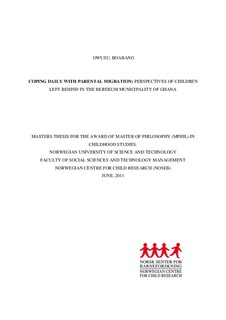| dc.contributor.advisor | Tingstad, Vebjørg | nb_NO |
| dc.contributor.author | Owusu, Boabang | nb_NO |
| dc.date.accessioned | 2014-12-19T14:37:22Z | |
| dc.date.available | 2014-12-19T14:37:22Z | |
| dc.date.created | 2011-09-26 | nb_NO |
| dc.date.issued | 2011 | nb_NO |
| dc.identifier | 443624 | nb_NO |
| dc.identifier.uri | http://hdl.handle.net/11250/269019 | |
| dc.description.abstract | Migration has profound impact on the developmental process of any country. However, knowledge about and analysis of children‟s everyday life experiences and coping with parental migration when they are left behind have received less attention especially in Ghana. It is against this background that the study attempts to explores to understand the how these children cope with the absence of one or both parents, the care arrangements in their everyday life including barriers and the potential to satisfy their basic needs as well as protecting their rights. The social studies of childhood and structuration theory formed the theoretical framework that guided the study. This is because children live within the social structures and are affected by structural conditions as competent social actors with agency.
Data for this study was obtained from both published and unpublished sources and from fieldwork. The data from the fieldwork is based on qualitative data collected through in-depth interviews with 15 children (left behind) and 5 caregivers and 2 focus group discussions consisting of 8 informants each for boys and girls in the Berekum Municipality. A non-participant observation was done to compliment these methods. The study revealed that parents entrust children into the care of caregivers before migrating. Also remittances play important roles in the lives of children in catering for their basic needs. It further indicated that, some children receive remittances whereas; others do not receive remittances from their parents. Children do utilise their agency in many ways to cater for some of their basic needs by adopting/adapting a variety of coping strategies to cope with parental migration. Also children sometimes assume the role as parents to provide care to their siblings and caregivers. They also provide care to the family through duties and responsibility they perform in the family. The study illustrates the interdependencies that exist between parent children and caregivers by using the triangle of interdependencies.
It was also revealed that children suffer various forms of risks when they are left behind. Some of these include right deprivation (participation in decision making), health, feeding and shelter risks. Based on the findings the study concludes that some of the children live in good conditions and get their basic needs to life. However some of these children do not get support from their parents or sometime get inadequate support from parents forcing them out of school and engaging in other activities. It is therefore important that adequate care arrangements are put in place before parents embark on migration whilst considering the complex individual and social structures. | nb_NO |
| dc.language | eng | nb_NO |
| dc.publisher | Norges teknisk-naturvitenskapelige universitet, Fakultet for samfunnsvitenskap og teknologiledelse, Norsk senter for barneforskning | nb_NO |
| dc.subject | Social and Behavioural Science, Law | en_GB |
| dc.title | Coping Daily with Parental Migration: Perspectives of Children Left Behind in the Berekum Municipality of Ghana. | nb_NO |
| dc.type | Master thesis | nb_NO |
| dc.contributor.department | Norges teknisk-naturvitenskapelige universitet, Fakultet for samfunnsvitenskap og teknologiledelse, Norsk senter for barneforskning | nb_NO |
